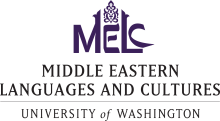The former department of Near Eastern Languages and Civilization (NELC) is now Middle Eastern Languages and Cultures (MELC)! This change was spearheaded by Assistant Professor Aria Fani, with assistance from Associate Professor Stephanie Selover and Associate Professor Hamza Zafer. The name change was approved unanimously by the faculty.
The NELC department was first established in 1969, founded by professors Nicholas Heer and Farhat Ziadeh, after an initial four years teaching in the Classics Departments. NELC was founded in order to allow for a greater breadth of Middle Eastern subjects, both language and cultural, than was previously present at the university, and to entice a number of new scholars to University of Washington to join the new department.
This year, we implemented the change of department name from NELC to MELC to acknowledge and embrace the diversity of the regions we continue to study, to raise the visibility of the courses and activities we offer, to stay up-to-date with developments in our fields of study, and to reflect the fact that we engage a great variety of different approaches, methodologies, and interests in our scholarly work.
Many of our current students are unfamiliar with the term “Near East,” while nearly all understand the concept of the “Middle East.” Partially, this change is about visibility and accessibility to our undergraduate community. Second, the concept of the “Near East” is more and more becoming an outdated term, with negative connotations of 19th century colonialism. While the “Middle East” is by no means a neutral term, it has more contemporary usage and has been embraced by many people from the region living in the United States as a way of making the political voices and community needs of people from the region heard.
Our department represents a vast region – from Morocco to China and all the diasporas beyond! In other words, our areas of interest include multiple languages, populations, and cultures. We also cover more than 4000 years of life in the regions we study. The new name for our department emphasizes plurality and inclusion.
We have changed the word “Civilization” to “Cultures.” The word “civilization” has a problematic history. Over time that word became associated with notions of Western and European superiority. At UW, we strive for understanding of the complexities and interactions of many groups of people and kinds of cultural expression. Our department represents a vast region with a multiplicity of languages, populations, cultures, textual corpora, styles in art and architecture. The singularity of the term “civilization” leaves out this cultural multiplicity. Furthermore, for a long time now the term “civilization” has been regarded as a problematic term for reasons of its social evolutionary basis and its commitment to the idea of “progress”. Using the term civilization carries the idea that some populations are primitive and backward while “civilizations” are advanced and progressive. We feel as a faculty that the word “cultures” more fully incorporates what we do as a department and what we have to offer the university.
In changing our name from NELC to MELC, we are also in keeping with a larger trend throughout the country. Numerous other universities, including UC Berkeley, University of Michigan, Columbia University, and the University of Chicago, have either changed their departmental or program names from Near Eastern to Middle Eastern, or are in the process of doing so.
Finally, it is important to note that our faculty and scholarly interests have broadened significantly in the past decade. We continue to emphasize languages and literatures, but we have added new language courses (Ge’ez and Ladino), new strengths in archaeology and art, new expertise in Sephardic history and Ottoman studies, a focus on the Horn of Africa, extensive projects in Digital Humanities, and more. In short, we are in many ways a new and renewed department, and a new name will help us celebrate and call attention to the innovations in our curriculum and research.
The faculty of the future MELC department feel this is an important and vital step in our goals of continuing to be innovators in the field of Middle Eastern and Central Eurasian studies. We are proud that artist Mamoun Sakkal, who made our older NELC logo, was willing to make us a new logo to go with our new designation.
In the future, our NEAR E courses will carry a MELC prefix, while our BA degrees will be in Hebrew Bible and Ancient Near Eastern Studies, Comparative Cultures, and Languages and Literatures, and our M.A. program will be in Middle Eastern Languages and Cultures. We look forward to the future of MELC.
Stephanie Selover
